|
|
|
Sort Order |
|
|
|
Items / Page
|
|
|
|
|
|
|
| Srl | Item |
| 1 |
ID:
126631
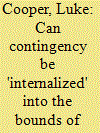

|
|
|
|
|
| Publication |
2013.
|
| Summary/Abstract |
Can general mechanisms governing social life (necessity) and the possibility of multiple outcomes in socio-historical processes (contingency) be incorporated into a single theoretical framework? In recent years, the critical realist philosophy of science has emerged as an intellectual strand within international relations (IR) that makes theoretical claims about necessary social processes while recognizing the irreducible role of contingency. However, critical realist scholars treat contingency as an 'externality', thereby declining to theorize social processes that result in contingent outcomes. Here, it is argued that contingency emerges out of the combination of events and processes as theorized by the law of uneven and combined development. This provides a general conceptualization that treats differentiated historical outcomes, and their contingencies, as inherent to human development. Out of these assumptions a workable approach to historical sociology in IR can be developed-one predicated upon uncovering the form of historical 'combination', the contingent fusion of elements, in international systems.
|
|
|
|
|
|
|
|
|
|
|
|
|
|
|
|
| 2 |
ID:
176074
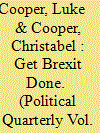

|
|
|
|
|
| Summary/Abstract |
This article analyses the successful Conservative election campaign of 2019 and how it took advantage of a fractured political and economic landscape. It reviews the unique circumstances around the 2019 election and the ‘surprising death’ of a no‐deal Brexit. We then analyse the divergent political communication strategies in the 2017 and 2019 Conservative campaigns showing how the latter was much more coherent and politically unorthodox. Drawing on socioeconomic, demographic and British Election Study data, we argue that Boris Johnson’s messaging was carefully tailored towards the demands of voters in the ‘red wall’ seats. Conservative success was built around an appeal to voters in these economically depressed ‘geographies of discontent’. But while tremendously successful, the coalition this created is potentially fragile. An unconventional, ‘leftish’ Conservative campaign built a new, diverse bloc of voters. It includes a number of left‐wingers expecting change alongside traditional Conservative supporters, and will be hard to keep together given the economic turbulence ahead.
|
|
|
|
|
|
|
|
|
|
|
|
|
|
|
|
| 3 |
ID:
189985
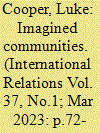

|
|
|
|
|
| Summary/Abstract |
Drawing on the concept of uneven and combined development this article critically interrogates Benedict Anderson’s theory of the ‘imagined community’ through an historical investigation into the English-realm-cum-British-empire. Placing its rise in the context of the conflicts of Post-Reformation Europe, it identifies vectors of combined development (money, goods, ideas, people) which shaped the formation of new imagined communities. These post-Reformation struggles were not defined by nationality but subjecthood, which saw ‘the realm’ displace the monarch as an object of rights and duties. The 18th century rise of British nationalism was a response to the long crisis of subjecthood (1639–1688). However, this emergence was uneven and non-linear, such that it co-existed as a political imagination with continued belief in – and political support for – subjecthood. Ironically, given its latter-day mythology, the American Revolutionary War was fought to protect subjecthood under the Crown from subordination to the British nation and its parliament.
|
|
|
|
|
|
|
|
|
|
|
|
|
|
|
|
| 4 |
ID:
139587
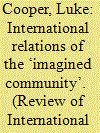

|
|
|
|
|
| Summary/Abstract |
Benedict Anderson's Imagined Communities has long been established as one of the major contributions to theories of nations and nationalism. Anderson located the rise of national identities within a long-evolving crisis of dynastic conceptions of identity, time, and space, and argued print-capitalism was the key cultural and economic force in the genesis of nations. This article offers a critical appropriation and application of Anderson's theory through two steps. Firstly, it evaluates the conceptual underpinning of his approach through an engagement with recent scholarship on the ‘theory of uneven and combined development’. The fruits of this interchange provide a deeper analytical framework to account for what Anderson calls the ‘modularity’ of national identity, that is, its universal spread across the globe. Modularity is now reconceptualised as a product of combined development with its causal efficacy derived from the latent dynamics of a geopolitically fragmented world. The latter gave shape and form to the new national communities. Secondly, this revised framework is applied to the emergence of Chinese national identity in the late nineteenth century. This allows Chinese nationalism to be recast as an ideological amalgam of indigenous and imported elements that emerged out of the crisis-ridden encounter between Imperial China and Western imperialism in the nineteenth century.
|
|
|
|
|
|
|
|
|
|
|
|
|
|
|
|
| 5 |
ID:
179043
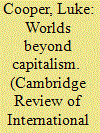

|
|
|
|
|
| Summary/Abstract |
This article explores the implications of uneven and combined development for how system-change is conceptualised. The current moment has featured extensive discussions of how technological transformation is altering the nature of our economy, labour force and environment. Postcapitalists argue that zero cost production undermines the price mechanism in capitalism and opens up new emancipatory possibilities for the construction of the commons. This powerful critique and political vision is let down, however, by a failure to incorporate ‘the international’ dimension into the theory of change. UCD provides a vitally needed correction to this unilinear thinking. To recover an understanding of how societal multiplicity affects the nature of system-change, this article makes the until-recently unusual step of turning to fictional literature. Specifically, it investigates the dynamics of uneven and combined development within the imagined universe brought to life by Kim Stanley Robinson’s science fiction odyssey the Mars trilogy. Despite the events Robinson describes existing wholly in the realm of imagined fantasy, I argue the three books contain five images of uneven and combined development relevant to real world social struggles. Drawing these out can start to develop a normative, political conception of uneven and combined development for the twenty-first century.
|
|
|
|
|
|
|
|
|
|
|
|
|
|
|
|
|
|
|
|
|